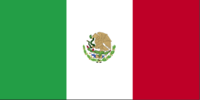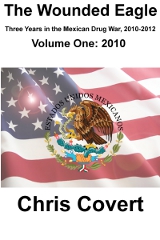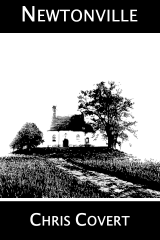Drug Cartels Maintain a Pall of Censorship in Drug War News

2010-12-13
Posted by: badanov
Google Translate
A few caveats about this piece: The news weekly reporting the news, Proceso is a known leftist publication, and an anti-Calderon publication as well. Whether this affects the accuracy of the reporting we can only tell in time.
In Mexican political parlance, the editors at Proceso not only believe in La Revolucion, they do not think it is finished.
Inasmuch as they're commies, they do seem to have a handle on Mexican national politics albeit from an alternative perspective.
Much of what you will read here is a confirmation of individuals comments I have read mainly in narco blogs since last spring that the Gulf cartel and Los Zetas basically run the show in Tamaulipas. What little information gets out with regard to counternarcotics operations is in spite of their efforts.
What is going on in Tamaulipas is much, much worse than I have even dared to guess.
The testimony that crosses the wall of silence erected across the border suggest that perhaps Tamaulipas surpasses Chihuahua's death toll.
Tamaulipas reporters speak quietly of days of fighting with 200 dead; of stretches of highway with landscapes of dead teenagers, almost children, scattered for several meters; bodies that no longer pass through the SEMFLO, funeral homes, or cemeteries and graves go directly to host multiple burials; traces of blood in the streets as the only evidence of the murders that go beyond the statistics funeral.
It is difficult to prove the claims. Unlike cities such as Juarez, Tamaulipas news reporters often guess because the number of killings is unknown. The authorities deny them that information. The Center for Border Studies and Promotion of Human Rights, AC (CEFPRODHAC), the organization that had an inventory of deaths, stopped doing so last year.
"I walked investigating where the dead were, but not in cemeteries; they are not there. The funeral homes do not want to give information. Asking the police is like talking to the drug traffickers and if we know that, reporters are doing worse. For two years I maintained death toll statistics that now I can not," laments a Spanish reporter working for a Texas newspaper, his name omitted for security purposes. He says he is threatened the same as their Mexican counterparts. He even had his will made.
Tamaulipas is the closest thing to a criminal dictatorship, with areas controlled by the Gulf Cartel and others by Los Zetas since February vie for state. Over the past decade, whichever is a quiet zone, is probably on the payroll: business people, governors, journalists, mayors, police and an army of informants. Some areas even have training camps for new assassins, and yet the local media under censorship.
The late Polish journalist Ryzsard Kapuscinski wrote about it: "Silence has its laws and its demands. The silence requires concentration camps in remote areas are lifted. The silence needs a massive police apparatus. You need armies of informers. Silence demands that its enemies disappear suddenly and without a trace. not like any voice, and of complaint and protest, and indignation, disturb the peace and quiet. Where such a voice is heard, the silence hit with all strength and restore the previous state, in other words, the ideal state of silence. "
Tamaulipas is not far from that description that requires silence of the media based on the U.S. side of the Rio Grande.
Texas newspaper publishers, such as the San Antonio Express-News Laredo Morning Times or have sent their reporters to the Mexican side to document information as basic as the number of dead after the fiercest clashes between gangs or them against federal forces, but two years on, do not get reliable figures.
"The day after the shooting of Matamoros (in which Ezequiel Cardenas Guillen, the Tony Storm, died), the government reported 10 deaths; on the border that means 40 to 50, and U.S. officials told us they were more likely 100. We had to write a note saying they were at least 10 and a maximum of 100. In the newspapers of the United States is unthinkable to give figures so vague, but we are driven to it," complains Nora Lopez, editor of San Antonio Express-News.
And so my personal judgment of the inaccuracy of the death toll reported by the Brownsville Herald was wrong, and that the 47 reported killed in that operation was probably much closer to the truth.
Most of the local press is muzzled. Reporters from national and foreign media who wish to research in the area should plan prior to their admission to a logistics operation, although they are not guaranteed to come out unscathed. Several outsider reporters have been taken hostage by criminals, beaten for several hours and expelled with the caveat that they will pay the following interference with his life.
One Tamaulipas reporter tells a story: his brother resigned from the municipal police department of Nuevo Laredo, traumatized and sick because he was sent to pick up bodies "of dead children...", and throwing them into a hole in the ground like dogs.
Even the most experienced journalists border in Tamaulipas feel they standing in quicksand, as supported by Alfredo Corchado, veteran correspondent for The Dallas Morning News in February. When the war started between the Zetas and the Gulf Cartel, Corchado managed to get a couple of hours to report to Reynosa and informed the world that dozens of people had died the previous weeks and eight journalists were missing.
"There are regions where silence dominates, where fear is felt and seen among the people. And I saw that in Reynosa, I was very impressed. Organized crime in the region has emerged as a parallel government that dominates even the press. You can feel the helplessness of the people, the government," says a Proceso journalist recently awarded for his courageous coverage.
Although since 2007 Juärez is considered the most dangerous city in Mexico, and according to some estimates, the world, most of the correspondents in the border state of Chihuahua feel safer than in Tamaulipas.
"Ciudad Juarez is too large, it is hard to tame the city and the journalists there have more space. Ironically, I feel more relaxed in Juarez, unlike Matamoros, Reynosa, Ciudad Aleman, Nuevo Laredo, Tamaulipas and other municipalities where you do not trust anyone; only very few people and where the dynamics of Los Zetas have created a much more raw, more brutal, more sophisticated urban warfare issue; they know how to control information and control, subordinate, threaten and kill the reporter; unfortunately, is part of their strategy," he says.
According to Mexican journalist Jorge Luis Sierra, founder of McAllen Times-located across the border state of Tamaulipas, this year more people may have died in Tamaulipas than in Ciudad Juarez, when considered in proportionate terms.
"The bulk of the violence has occurred since the apparent conflict between the Zetas and the Gulf cartel, which sparked a wave of violence since February. In Ciudad Juarez, where violence is older, local media have shown more independence and have continued to report the violence, but in Tamaulipas not."
He said that when CEFPRODHAC left Reynosa the count of violent deaths disappeared from independent sources to corroborate the information. News reporting means located in the Texas border have also failed to easily evade the news blackout.
"(The media Texans) are reporting news, but it is not so easy to cross the border. In times of increased violence they have refrained from entering. There was no guarantee for safety. Some American journalists had been threatened. It was difficult to go unnoticed. But the three major newspapers on this side of the border, the Brownsville Herald, the Monitor and the Laredo Morning Times are looking for news, trying to build sources on the other side of the border crossing when they can. The work has been a little easier with the hiring of bilingual Mexican reporters," he explains.
Sierra notes that during the fighting in Matamoros that culminated with the death of Ezequiel Cardenas, Brownsville Herald drove information from anonymous sources that mentioned dozens of deaths, because it was too risky to confirm the data on the ground, as one of their reporters was shot and killed. The NewsChannel 5 was required to make the region one of its reporters because he received death threats, then a cameraman was killed.
The San Antonio Express-News also was forced to withdraw a reporter from Nuevo Laredo. Last February, he failed to cross the border.
"Our security was not guaranteed," says Nora López, so she said had to take notes from the Mexico City or the Houston Chronicle. The blackout is such that Brezosky has been forced to report information from blogs and twitters of citizens.
"We struggled to get basic information like the death tolls. Before you give us information of the state's attorney (Tamaulipas), they do not want to say they know; they have to wait for orders from Mexico City and the Army also says it does not know. Before we went and saw bodies, now only the pools of blood because the narcos take theirs," says Lopez .
Heriberto Deandar, editor of El Mañana, Tamaulipas' leading newspaper and one of the leading research journals during the nineties until the attacks and murders of the journalists, was forced to publish no more about crime, "complained of censorship by the government:
"For a year and a half no one knows for certain how many were killed and wounded in the clashes. The Army does not release press bulletins, nor do state authorities. The PGR sends detainees throughout the country and alerts the municipality only through Facebook and Twitter on the location of risk ".
A reporter from an electronic means of Reynosa explained that local police refuse information on the fighting because they are in the service of drug trafficking.
"The list of dead is giving very refined, we know that there's more. The people tell us that more deaths were reported. The same criminals that die in the shootings disappear, if they kill an enemy, the body of the dead also goes, "he says.
A correspondent of a national media said that it was impossible to explain to their bosses, based in Mexico City, the police did not let it come to where there was gunfire, officials did not provide data and that prosecutors do not receive reporters.
"Just day before yesterday they denied that there were dead and I know that at least one person was killed in Nuevo Laredo, because it was my name. The office no longer updated information on the Internet and do not answer or when you request information through the law transparency. Even the victims do not want to give us information because they distrust of journalists and they think we're in collusion. And the army feels the same. We all categorized as corrupt," he laments.
Several say they receive threatening phone calls and orders or direct warnings of reporters on the payroll of the cartels.
"It's absurd, sometimes they do not want us to publish a note that everyone knows because earlier the twiteros reported it. Or the worst: they want us to cover their assaults against the army", says a reporter from Matamoros.
Censorship reaches high that even the reporters find out about the events through Twitter or Facebook. "The authority does not inform us that we should do it and we can not. The radio and television stations do not tell you where there are shootings; only the social networking does that."
A Matamoros news reporter sets forth the rules imposed on them by criminals: "We can not give precise data in a footnote to name any of the cartels, or expand on information, not to mention the violence. The only thing we give up is the death of the candidate (for governor Rodolfo Torre) Cantú."



